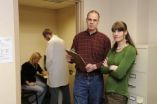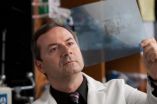Mayo Clinic researchers confirm value of therapeutic hypothermia after cardiac arrest
2011-02-20
(Press-News.org) ROCHESTER, Minn. - Mayo Clinic researchers confirmed that patients who receive therapeutic hypothermia after resuscitation from cardiac arrest have favorable chances of surviving the event and recovering good functional status. In therapeutic hypothermia, a patient's body temperature is cooled to 33 degrees Celsius following resuscitation from cardiac arrest, in order to slow the brain's metabolism and protect the brain against the damage initiated by the lack of blood flow and oxygenation. This study was published in the December 2010 issue of Annals of Neurology.
"Therapeutic hypothermia is a neuroprotective strategy. Brain recovery is the main determinant of outcome for patients who survive cardiac resuscitation," says Alejandro Rabinstein, M.D., a Mayo Clinic neurologist. "For a number of years, we have collected information about what determines whether or not a patient is going to wake up after resuscitated cardiac arrest. However, most of this information comes from the time when patients were not treated with therapeutic hypothermia, which now has become the standard of care for many cases of cardiac arrest. We wanted to know whether hypothermia therapy changed what we knew before about how to estimate neurological prognosis in these patients."
In this study, Dr. Rabinstein and his team identified 192 patients, more than 100 of whom were treated with therapeutic hypothermia. Detailed neurologic exams were performed, including electroencephalograms, brain CT scans, and measurement of neuron-specific enolase (NSE). NSE is a substance detected in the blood that provides information about the extent of brain damage.
"The results of the study mainly validated what we knew about prognosis following cardiac arrest from non-hypothermia cases. The findings on physical examination on the days following cardiac arrest remain most valuable in estimating the prognosis," says Dr. Rabinstein.
High NSE level in the blood was shown to reliably predict poor outcome after cardiac arrest in patients not treated with hypothermia. However, less is known about the value of this marker in patients who are cooled after the cardiac arrest. Although in this study the presence of elevated levels of NSE was statistically associated with worse outcomes in patients treated with hypothermia, Dr. Rabinstein concluded that the NSE level was not sufficiently reliable to estimate the prognosis in this group of patients because elevated levels were also seen in some patients who recovered well. Therefore, the NSE level should not be used in isolation to define prognosis in patients treated with hypothermia. "That was a remarkable finding of our study that deserves more attention," he says.
"It's important for people to know that among patients treated with therapeutic hypothermia following resuscitated cardiac arrest, up to two-thirds of them may go home with good function," says Dr. Rabinstein. "We are still examining how these patients recover in terms of higher intellectual faculties, but certainly these are results that were not even conceivable prior to the application of therapeutic hypothermia."
INFORMATION:
Other members of the Mayo team included Jennifer Fugate, D.O.; Eelco Wijdicks, M.D., Ph.D.; Jay Mandrekar, Ph.D.; Daniel Claassen, M.D.; Edward Manno, M.D.; Roger White, M.D.; and Malcolm Bell, M.D.
END
ELSE PRESS RELEASES FROM THIS DATE:
2011-02-20
AMES, Iowa -- Why would anyone falsely confess to a crime they didn't commit? It seems illogical, but according to The Innocence Project, there have been 266 post-conviction DNA exonerations since 1989 -- 25 percent of which involved a false confession.
A new Iowa State University study may shed light on one reason for those false confessions. In two experiments simulating choices suspects face in police interrogations, undergraduate subjects altered their behavior to confess to illegal activities in order to relieve short-term distress (the proximal consequence) while ...
2011-02-20
Yet some athletes deliberately train at high altitude, with less oxygen, so they can perform better. Their bodies adapt to the reduced oxygen.
Now a doctor at the University of Colorado School of Medicine has explored the relationship between lack of oxygen, called hypoxia, and the inflammation that can injure or kill some patients who undergo surgery. In a liver transplant, for example, the surgery and anesthesiology can go perfectly yet the new liver will fail because of hypoxia.
"Understanding how hypoxia is linked to inflammation may help save lives of people who ...
2011-02-20
A powerful solar flare has ushered in the largest space weather storm in atleast four years and has already disrupted some ground communications on Earth, said University of Colorado Boulder Professor Daniel Baker, an internationally known space weather expert.
Classified as a Class X flare, the Feb. 15 event also spewed billions of tons of charged particles toward Earth in what are called coronal mass ejections and ignited a geomagnetic storm in Earth's magnetic field, said Baker, director of CU-Boulder's Laboratory for Atmospheric and Space Physics. Such powerful ejections ...
2011-02-20
When studying relationships, psychological scientists have often focused on how couples fight. But how they recover from a fight is important, too. According to a new study published in Psychological Science, a journal of the Association for Psychological Science, couples' abilities to bounce back from conflict may depend on what both partners were like as infants.
Researchers at the University of Minnesota have been following a cohort of people since before they were born, in the mid-1970s. When the subjects were about 20 years old, they visited the lab with their romantic ...
2011-02-20
LOS ANGELES (February 18, 2011) – Scientists at the Children's Center for Cancer and Blood Diseases and The Saban Research Institute of Children's Hospital Los Angeles today announced a breakthrough discovery in understanding how the body fights leukemia. They have identified a protein called CD19-ligand (CD19-L) located on the surface of certain white blood cells that facilitates the recognition and destruction of leukemia cells by the immune system. This work represents the first report of a bioengineered version of CD19-L, a recombinant human biotherapeutic agent, ...
2011-02-20
PITTSBURGH, Feb. 18 – Only one out of more than 1,900 people evaluated met the American Heart Association (AHA) definition of ideal cardiovascular health, according to a new study led by researchers at the University of Pittsburgh School of Medicine. Their findings were recently published online in Circulation.
Ideal cardiovascular health is the combination of these seven factors: nonsmoking, a body mass index less than 25, goal-level physical activity and healthy diet, untreated cholesterol below 200, blood pressure below 120/80 and fasting blood sugar below 100, explained ...
2011-02-20
DALLAS – Feb. 17, 2011 – Low levels of the anti-aging hormone Klotho may serve as an early warning sign of the presence of kidney disease and its deadly cardiovascular complications, according to findings by UT Southwestern Medical Center researchers.
Using mice, investigators found that soft-tissue calcification, a common and serious side effect of chronic kidney disease (CKD), improves when Klotho hormone levels are restored. The study is available online in the Journal of the American Society of Nephrology.
The essential Klotho protein, which is produced by the kidneys, ...
2011-02-20
One bad apple is all it takes to spoil the barrel. And one misfolded protein may be all that's necessary to corrupt other proteins, forming large aggregations linked to several incurable neurodegenerative diseases such as Huntington's, Parkinson's and Alzheimer's.
Stanford biology Professor Ron Kopito has shown that the mutant, misfolded protein responsible for Huntington's disease can move from cell to cell, recruiting normal proteins and forming aggregations in each cell it visits.
Knowing that this protein spends part of its time outside cells "opens up the possibility ...
2011-02-20
Researchers from the Georgia Institute of Technology have created a new sampling device that could prevent thousands of people worldwide from dying of pneumonia each year.
Called PneumoniaCheck, the device created at Georgia Tech is a solution to the problem of diagnosing pneumonia, which is a major initiative of the U.S. Centers for Disease Control and Prevention (CDC).
Pneumonia, an inflammation of the lungs, kills about 2.4 million people each year. The problem is particularly devastating in Africa, Southeast Asia and the Eastern Mediterranean, where a child dies ...
2011-02-20
The most widely prescribed antidepressants – medicines such as Prozac, Lexapro and Paxil – work by blocking the serotonin transporter, a brain protein that normally clears away the mood-regulating chemical serotonin. Or so the current thinking goes.
That theory about how selective serotonin reuptake inhibitors (SSRIs) work can now be put to the test with a new mouse model developed by neuroscientists at Vanderbilt University.
These mice, described in the online edition of the Proceedings of the National Academy of Sciences (PNAS), express a serotonin transporter that ...
LAST 30 PRESS RELEASES:
[Press-News.org] Mayo Clinic researchers confirm value of therapeutic hypothermia after cardiac arrest



